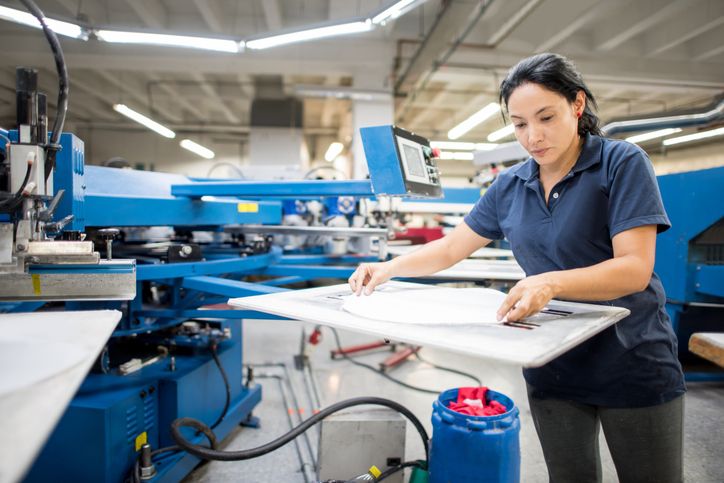 Attend Chief Executive’s 5th Annual Smart Manufacturing Summit May 15-17 in Seattle, Washington. Co-hosted by Boeing, join peer CEOs to discuss the key strategies, tactics and opportunities in 21st-century manufacturing. Registration includes insider tours of Boeing’s largest facility and Microsoft. Click here to save $200 on your registration.
Attend Chief Executive’s 5th Annual Smart Manufacturing Summit May 15-17 in Seattle, Washington. Co-hosted by Boeing, join peer CEOs to discuss the key strategies, tactics and opportunities in 21st-century manufacturing. Registration includes insider tours of Boeing’s largest facility and Microsoft. Click here to save $200 on your registration.

We’ve been batting around manufacturing skill gap projections for years. But while the numbers can vary depending on who did the survey and how it was done, there is no doubt about it: there are not going to be enough people to fill the number of manufacturing jobs available by 2025. In fact, one report by Deloitte and The Manufacturing Institute puts the shortage at 2 million. And by then millennials, will make up nearly half of the U.S. workforce.
While this young generation offers a sizeable talent pool to help fill the need, they can be a finicky bunch. Unlike older generations, they’re less motivated by money, more motivated by ideology, and can demand more of their employers. Here are 4 things that might help bridge the gap and bring millennials to your factory floor.
1. A tech-oriented culture and good pay. Manufacturers still suffer a perception that their jobs are dirty and dangerous. Kevin Kramer, president of Alliance Technical Solutions, said manufacturers need to promote the tech-oriented aspects of the sector and combat the idea that manufacturing jobs are “low-paying grunt work.”
Millennials aren’t as driven by money as other generations, but it’s still an important factor, especially since many carry high levels of student debt. According to the Bureau of Labor Statistics, the manufacturing industry offers some of the highest wages of any sector. Kramer said leaders need to participate in things like Manufacturing Day, attend job fairs and visit schools with presentations to educate students on the industry. “Create a roadmap of the types of careers available to them and teach them how the industry has evolved,” said Kramer.
2. The ability to grow. There’s a perception that millennials are job hoppers, yet many are willing to make a long-term commitment if they are valued. A Gallup survey of more than 1,700 workers found that millennials ranked the “opportunity to learn and grow” as the most important thing they look for when applying for a job.
Anne Donovan, a people innovation leader for PricewaterhouseCoopers in Los Angeles, said millennials also need to know they’re valued at all stages of their career. As a result, manufacturers need to strive to establish solid working relationships with their millennial workers to understand their needs and foster their development. “You have to have good relationships with your employees or good benefits won’t matter…so you need to make sure that these conversations are happening,” Donovan said.
3. A good work-life balance. The traditional idea of committing oneself to a job 40 hours per week for 35 years with little time off doesn’t bode well with millennials. Tom McLaughlin, executive director of the Center for Advanced Manufacturing Puget Sound (CAMPS), said millennials “see life-work balance as important, and will move to a better environment if opportunities are not made available to them in their career pathways.”
Successful manufacturers will need to consider things like extended time-off, flexible schedules, and the ability to work remotely. Bill Baker, president of Speed to Excellence, said manufacturers need to promote a work environment that fosters not only hard work, but fun with things like ping-pong tables, workout rooms, flex time and casual wear. “These are meant to create an environment of creativity by supporting hard work and hard play, all at the work site,” said Baker.
4. Meaning and engagement. Russ Weed of UniEnergy Technologies in Mukilteo, Washington, said millennials also consider their societal needs and want “something more important than just a job.” Engagement is dwindling among American workers and another survey found that more than 70% of millennials said they are “disengaged” in their jobs.
Brandon Rigoni, PhD, associate director for Selection and Development at Gallup, feels manufacturers can use this high level of disengagement to recruit millennials who are willing to switch jobs and companies. He said millennials are “consumers of the workplace” and ultimately shop around for jobs that best align with their needs and life goals. “More than ever, employers need to know and act on the factors that make their company appealing to these candidates,” said Rigoni.
Join peer CEOs at Chief Executive’s 5th annual Smart Manufacturing Summit, May 15th – 17th 2017, outside of Seattle, Washington. Manufacturing CEOs will discuss the key strategies, tactics and opportunities in 21st-century manufacturing. Co-hosted by The Boeing Company, CEO Dennis Muilenburg will be a featured speaker.

Chief Executive Group exists to improve the performance of U.S. CEOs, senior executives and public-company directors, helping you grow your companies, build your communities and strengthen society. Learn more at chiefexecutivegroup.com.
0

1:00 - 5:00 pm
Over 70% of Executives Surveyed Agree: Many Strategic Planning Efforts Lack Systematic Approach Tips for Enhancing Your Strategic Planning Process
Executives expressed frustration with their current strategic planning process. Issues include:
Steve Rutan and Denise Harrison have put together an afternoon workshop that will provide the tools you need to address these concerns. They have worked with hundreds of executives to develop a systematic approach that will enable your team to make better decisions during strategic planning. Steve and Denise will walk you through exercises for prioritizing your lists and steps that will reset and reinvigorate your process. This will be a hands-on workshop that will enable you to think about your business as you use the tools that are being presented. If you are ready for a Strategic Planning tune-up, select this workshop in your registration form. The additional fee of $695 will be added to your total.

2:00 - 5:00 pm
Female leaders face the same issues all leaders do, but they often face additional challenges too. In this peer session, we will facilitate a discussion of best practices and how to overcome common barriers to help women leaders be more effective within and outside their organizations.
Limited space available.

10:30 - 5:00 pm
General’s Retreat at Hermitage Golf Course
Sponsored by UBS
General’s Retreat, built in 1986 with architect Gary Roger Baird, has been voted the “Best Golf Course in Nashville” and is a “must play” when visiting the Nashville, Tennessee area. With the beautiful setting along the Cumberland River, golfers of all capabilities will thoroughly enjoy the golf, scenery and hospitality.
The golf outing fee includes transportation to and from the hotel, greens/cart fees, use of practice facilities, and boxed lunch. The bus will leave the hotel at 10:30 am for a noon shotgun start and return to the hotel after the cocktail reception following the completion of the round.